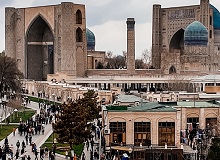


According to a CID Gallup survey, 44% of Salvadorans identify as evangelical, and 38% as Catholic. “In just one generation, the Catholic Church has lost 17% of its members”.

More than 50 evangelical churches have been allowed to register. Johannes Reimer (Peace and Reconciliation Network) shares about the new unity and social action of Christians in the Central Asian country.

As Christians in today’s culture, we need to have an awareness of the competing gods of digital Babylon. If we actively serve the gods of Europe, we may in the end find ourselves not worshiping the God of the Universe.

May this crisis make you ponder life and death, and what is truly valuable.

The Bible offers not only encouragement for personal faith in a time of crisis, but also wisdom and insight to guide the Christian in a position of public leadership or influence.

The Chinese Christian Church in Spain closely follows the religious freedom changes happening in its home country. “The government wants all evangelical churches to be subject to the organisation of the Three Autonomies”.

Is there a way for us to talk about Christian eschatology that both acknowledges brokenness and affirms goodness?

As technologically simulated relationships become ever more realistic and superficially convincing, we must be aware of the risk that the simulacrum will exert a seductive appeal to our hearts.

Should we teach our children to be polite to Alexa, to say please and thank you, to respect its ‘virtual’ feelings? Or is it of no significance if children abuse, tease and bully a simulated slave-person?

Will the promotion of ‘relationships’ with machines contribute to societal wellbeing and human flourishing, or provide new opportunities for manipulation and deception of the vulnerable?

Many Christians seem to uphold traditional ideas about fatherhood that lack both the precision and nuance needed to father in today’s world.

Each year more than 3 million girls are at risk of FGM. World Vision warns that legislative changes are not enough. “It is still necessary to raise awareness to destroy false myths”.

More than 45 world leaders gathered in Jerusalem to commemorate the 75th anniversary of the liberation of Auschwitz. They publicly committed to never forget the lessons of the Holocaust.

Why God’s four questions in Genesis 3 should still be asked today.

Concern for the poor, starting with those within the Christian ‘family’, is laced through the fabric of the Gospels and Epistles.

Healthy families are central to a Christian understanding of flourishing society. They are the primary institution where commitment, sacrificial love, support and guidance can grow.

Let’s not allow the artificial and temporary newness, to take our focus away from the wonder of all that is new for us in Christ.

A review of John Mark Comer’s latest book The Ruthless Elimination of Hurry.

The miracle of new beginnings, the miracle of justice realised and the miracle of changed hearts.

In a letter sent to census authorities, dozens of academics said they “are concerned that this will damage our ability to capture and remedy sex-based inequality”.

Caring for God’s creation is one way in which we can express our love for God.

Without context, God’s epoch-defining intervention in human history to rescue and transform the world, is turned into an anodyne children’s story.

Brexit has had a reductionist and therefore dehumanising effect. It encourages us to see people as ‘The Other’.

To act justly is to pay fair wages, and also to pay workers in a fair manner.

We the citizens have a responsibility, not just the politicians, for seeing justice done and advancing the good of our society.

Las opiniones vertidas por nuestros colaboradores se realizan a nivel personal, pudiendo coincidir o no con la postura de la dirección de Protestante Digital.